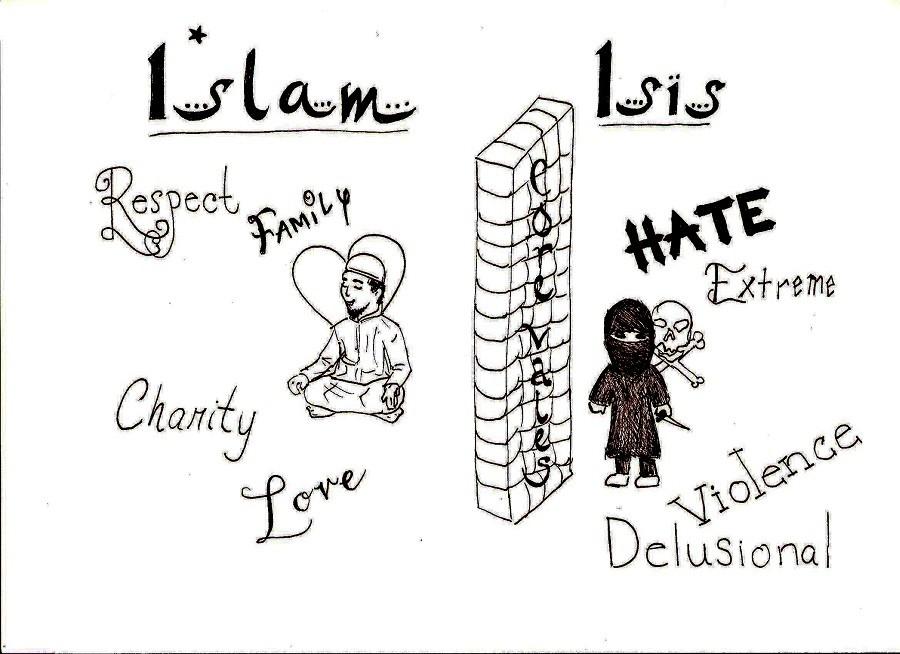ISIS: Twenty-first century Nazis?
March 25, 2015
ISIS: Closer to Nazis than Muslims
Here’s an idea about ISIS you may not know: ISIS is not actually founded on Islam. In fact, ISIS members really have more in common with Nazis than Muslims.
When ISIS first appeared on the global stage, the United States government dismissed the group as unimportant in the long run and not a real threat. Obviously, this has been proven false by many accounts. Just as the Nazi Party slowly rose to power in 1930s Germany, so has ISIS today, gaining followers from across the world.
There is no doubt that when and if ISIS is extinguished, another terrorist group will emerge. After all, Al-Qaeda was terrorizing the Middle East and the Muslim Brotherhood was in Egypt before ISIS, which has in turn been able to use different methods and learned from previous organizations’ mistakes in order to be more successful.
The next terrorist group that forms will use mistakes ISIS made to be even stronger. Governments, especially the United States, should not underestimate the potential for power any new terrorist group has. We as a nation can learn from the mistake of disregarding ISIS, and pay more attention when the next terrorist group comes forth.
ISIS has been able to gain such support from social media such as Twitter. In fact, according to Newsweek “between September and December 2014, there were at least 46,000 ISIS-supporting Twitter accounts.” These Twitter accounts, as well as accounts following these accounts, have been disabled. However, it isn’t difficult for these people to create new accounts. Although students may be curious to see the videos and Tweets from ISIS members, there is a trap that forms when extremists see innocent views as Western support for their actions. As students, steer clear of ISIS propaganda and you can help reduce the power they hold on the Internet. Don’t spread around their propaganda thinking it’s purely entertainment. The more people see their videos, the more recruits ISIS will be able to gain.
On the topic of high school students, recall the three London teenagers who recently left to join ISIS. These teenage girls are the same ages as some Hollis Brookline students. It seems unthinkable that girls our age would leave the safety of home to join such a violent group. The Guardian states that “sixty British women and girls, including 18 teenagers” have left London to join ISIS. First world country authorities need to step up their security regarding terrorists so that more supporters are caught before they land in the Middle East, not killed in an airstrike after the fact.
The violence that ISIS proudly shows through videos and images to the world is downright horrifying. Beheadings of prisoners and live burnings of those fighting against them all prove the point that ISIS members are heartless, and unable to be reasoned with. United Nations High Commissioner for Human Rights Zeid Ra’ad Al Hussein said in an interview with NPR: “They have reportedly buried children alive, crucified them, beheaded them.” You’ll find a vast majority of Muslims are appalled at ISIS’ actions, just as the rest of the world is.
So how is it that seemingly normal and rational people have left to join an irrational, violent, and extreme terrorist group?
ISIS has been very successful in terms of fighting and recruiting members. With different strategies than Al-Qaeda, PBS states that ISIS has “ more than 12,000 foreign fighters from at least 81 countries stationed in Syria alone.” ISIS even attempts to portray a sense of inclusivity, saying in a video quoted by PBS: “‘This is more than just fighting. We need the engineers, we need doctors, we need professionals … There is a role for everybody.’”
This appeal to those feeling excluded by society may be the factor that tips the scale. Many of the members are simply adventure-seekers. Of course, many are radical Muslims. Make no mistakes, however. ISIS is not a friendly group, nor is it honorable in any way to be in such a group. Joining does not make you dedicated to Islam and anyone who does should not be shown pity. The numerous people who leave first world countries to join ISIS are fully aware of the horrific actions that have been completed by this group. Not only are these recruits okay with such actions, but they also desire to be a part of such behaviors. Any members of ISIS that are captured should not be shown forgiveness for such dark morals.
But what is it that ISIS wants, exactly? Graeme Wood of the Atlantic writes: “Following takfiri doctrine, the Islamic State is committed to purifying the world by killing vast numbers of people.” Wood also says that ISIS “hungers for genocide” and that “roughly 200 million Shia are marked for death”.
Hitler and the Nazi party also wished to purify the world by killing vast numbers of people. Shia is a religion–a denomination of Islam, just as Judaism is related to Christianity.
ISIS has expanded its destruction to art and archeological artifacts as well (Surprise: So did the Nazi Party). The motivation behind such acts is to destroy the heritage and culture of regional minorities.. The carnage is taking place in museums and hallowed ruins, and around 2,000 of Iraq’s archaeological dig sites have also been ruined by ISIS.
A video posted on the Internet shows ISIS members knocking over ancient statues and breaking artifacts with hammers. These works of art survived for multiple centuries, some over 3,000 years, only to be shattered to pieces. A man in the video claims that the statues “promote idolatry.” The video is heartbreaking for anyone who even remotely appreciates art. “One of the items, depicting a winged-bull Assyrian protective deity, dates back to the 9th century B.C.”
ISIS has also burned around 2,000 books and, according to CBS News, many of the books were rare and over 800 years old. Only the Islamic texts were untouched. Under Hitler’s rule, the Nazis burned “over 25,000 ‘un-German’ books on Opernplatz in Berlin,” according to the University of Cambridge Library.
In short, ISIS does not represent Islam nor does it value the Islamic traditions and cultures that are so important.
Hussein states: “The honorable treatment of captives is part of the Islamic tradition. It is part of customary law when combatants surrender, as is the case with civilians, they are not to be harmed and mistreated, and [ISIS] violated customary law, international and humanitarian law, the Geneva Conventions and certainly Islamic tradition by executing captives in whatever way, or even harming them.”
Obviously ISIS has not done so.
In comparing ISIS members and Nazi Party members: Most Germans are not Nazis, and most Muslims do not support ISIS. ISIS is not based on Islam. Muslims are not the enemy and their traditions and cultures should be respected. Rather, the foundation of ISIS is hate. ISIS members claim to be Muslim, but as evident by their words and actions, do not follow the core beliefs of Islam.














